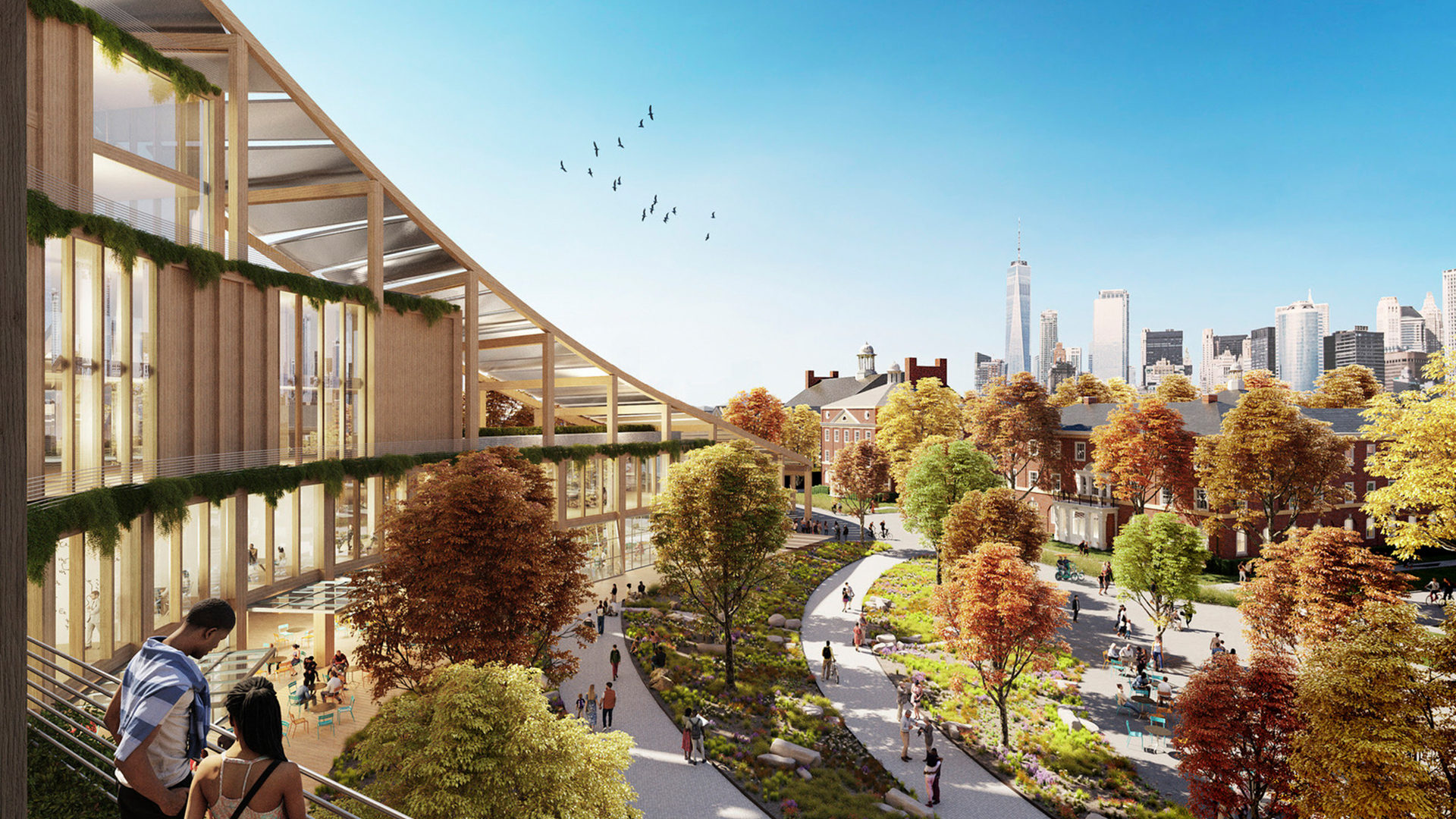
Photography by Michael Leckie
My tenure as President of the Royal Institution of Chartered Surveyors comes to an end this month, and as I reflect on my time serving RICS’ 140,000 global members, I am proud of all that has been achieved in 2024.
As President Elect, in 2023, I led the steering group which developed the RICS strategy ‘Future Foundations’, which set out the roadmap for the three years to come. In this very last column of the year, I want to take the opportunity to review our achievements and progress against the four pillars of our strategy, but also offer my view on where more can and should be done.
1. Enhancing member value and engagement
Putting our members at the centre of everything RICS does has been a driving force this year. Central to that is creating the right structures for ideas to feed through the organisation from our membership. We started the year by appointing the chairs and members of our six professional group panels. The work they do informs our standards, guidance and thought leadership and ensures our consistent relevancy.
As an organisation, RICS excels at bringing the profession together and this year our AGM – reimagined as an interactive member event - marked the turning point in our upward trajectory for member engagement. The record numbers of members putting themselves up for election at Governing Council (91), for the role of Senior Vice President (23) and for RICS awards this year is a clear demonstration of the growing enthusiasm and dedication among our members.
To harness this sentiment, in the second half of the year we launched RICS ‘Shaping the future’ events to listen to and engage with members across the regions.
A big part of RICS’ role as a professional body and standard-setter is to work together to respond to the industry’s rapid transformation. To facilitate these discussions, this year we also launched a series of marquee events, where RICS convened leaders in the sector to debate the subjects of importance to wider society. Subjects included Transforming Public Sector Property; Retrofit first vs Retrofit only; and the RICS Election debate, what does the new government need to do?
Finally, this year we undertook the re-launching of our historic headquarters building at Parliament Square. The vision is to create a vibrant, engaging hub to reinvigorate Great George Street – rebranded as ‘Surveyors House’ – which not only welcomes all members but also encourages partnerships and collaboration within the industry. The new members’ flexible workspace will be opening soon – please come and check it out.
2. Attracting a diverse next generation
Ask any enterprise what their barriers to growth are and they will almost certainly name the skills crisis. In our own research, 44% of respondents said that difficulties in sourcing skilled labour – particularly quantity surveyors and builders – is still one of the biggest barriers to growth.
As I wrote in my Modus column in August, “Plenty of untapped talent is waiting to join the global built environment boom – we need to inspire and welcome them.” This means that a diverse next generation is one of the most important keys to addressing the skills gap in our sector
Central to that should be education at a younger age on the importance of what we do. A Built Environment GCSE would be a transformative solution. I have championed this initiative in previous Modus and Building columns and I’m delighted that it is gaining traction across the industry and government.
I am proud that a wholly new forum was set up this year featuring diversity, equity and inclusion (DEI) representatives from the World Regional Boards and National Boards, which now convenes on a regular basis. It has positioned RICS as a strong part of the industry’s DEI cross-body collaboration.
This year RICS has pledged £90,000 to the Chartered Surveyors Student Bursary Programme. The bursary programme assists talented students from underrepresented backgrounds entering the property industry. Having had the opportunity to visit some of our accredited programmes in the UK and abroad, I have been impressed by the diversity and ambitions of the student body of future surveyors – this is where the future of our profession resides.
We have also grown our Matrics early career community globally this year, supporting activity in the UK, Europe, Hong Kong, and the UAE. At the UK Matrics Awards held last month in Manchester, I was moved by several young aspiring surveyors of diverse backgrounds confiding in me that I had been a role model for them in choosing to enter the profession.
“I have been impressed by the diversity and ambitions of the student body of future surveyors” Tina Paillet FRICS, RICS President
3. Strengthening trust in the profession
Key to strengthening trust in the profession is the influence RICS has. In my time as President, I had the honour of travelling the globe and working with our members to influence governments and fellow institutions. I was humbled to be in a position to engage with mayors, ministers, members of parliament and government administrators to advocate for the importance of RICS professionals in addressing the urban challenges that our major cities are facing. That includes the adoption of RICS professional standards and guidance.
As an organisation, I believe we have the necessary governance and committees in place, in part thanks to some of the developments this year. The appointment of a permanent chair and members of the Standards and Regulations Board is a key piece of governance for our regulatory arm and the Consumer Working Group (CWG). The CWG serves as an advisory panel on the interests of consumers and acts as an important reminder of the public for whom we ultimately carry out our duties.
We have the structure, governance and accountability to create trust. However, it is through our actions that we must keep it and build on it. From this privileged platform we must continue to demonstrate our relevance and leadership as the unequivocal setters of standards for the built environment.
4. Leading and influencing on sustainability
With temperatures reaching record highs this year and extreme weather events increasing across the globe, our industry’s role has become even more pertinent as the main facilitator for decarbonising buildings – which account for a staggering 37% of global emissions – and making our cities more resilient. The need for investment in decarbonisation of physical assets is both a huge hurdle and opportunity for us. McKinsey predicts that for global economies to reach net zero by 2050, €9.2tr must be spent annually, and collectively we should embrace this challenge.
The vision I set out in my presidential inauguration speech: for our profession to become the sought-after expert advisors on sustainability, is well underway. This year has been a groundbreaking one for RICS’ leadership in sustainability – launching standards and guidance including our very first Residential Retrofit Standard, a timely practice statement on the Impact of Carbon Markets on the Rural Economy, and the latest version of the Red Book incorporating mandatory ESG principles for the first time. Training for surveyors on these topics has also been a key part of upskilling for the new realities of a climate-challenged world.
One of our most important accomplishments for 2024 has been to develop an end-to-end solution for carbon accounting for the built environment, accredited by RICS, which will support corporations and governments alike to measure, improve and report on their progress toward net zero, in a standardised, reliable and benchmarkable manner.
The linchpin of this strategy is our award-winning WLCA Standard 2nd edition, which came into effect in July this year, and the harmonisation guide which positions this standard as a global framework for carbon accounting. The adoption of this standard by governments across the UK, Australia, Asia and the Middle East shows how RICS is leading the narrative on this important area. However, carbon is not the whole of the built environment’s impacts on the planet, and we’ll be asked for more.
As I discussed in Modus in September, only 1% of materials from demolition are re-used, destroying the value of the rest, and, creating around a third of the planet’s waste while consuming more than half of our dwindling primary resources along the way.
To address this, I co-founded the Circular Do Tank initiative, which launched this year in September. It brings together passionate built environment professionals and forward-looking organisations who have signed up to the pledge to undertake construction material and product re-use in their projects. The objective is to move beyond just talking about the circular economy and actively implement practices that reduce waste and increase resource efficiency to tackle the construction industry being the world’s largest consumer of raw materials.
“We have the structure, governance and accountability to create trust. However, it is through our actions that we must keep it and build on it” Tina Paillet FRICS, RICS President
A look ahead
As I write this final column for Modus, we are just days away from holding the very first RICS Global Sustainability Conference. We will hear from specialists across academia, finance, technology, government and the voluntary sector as they discuss practical solutions and evolving practices to tackle the most pressing issues facing our planet today.
Together, we will travel across the globe to gain precious insights and inspiration to foster a sustainable future for the built and natural environment.
This is RICS at its best: convening, informing, upskilling and preparing our members to take up the challenge and seize the opportunities that a changing environment brings. Leading and inspiring the next generation of talent across the globe. Providing confidence in our profession by promoting the highest professionalism and world-renowned standards, all through the ever-important lens of sustainability.
There couldn’t be a more fitting finale to my presidential year. This year we collectively built upon the foundations of our strategy. By continuing to act upon its four pillars in the years to come, I am certain that RICS will move from strength to strength.
It leaves me now to thank my colleagues and RICS members for their confidence, support, advice and insights along the way, which were essential in taking this action forward in what can only be described as a milestone year for myself and the organisation.


